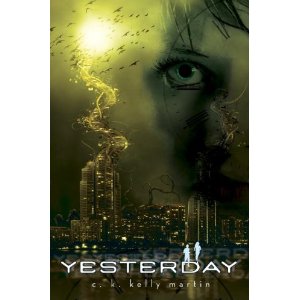Yesterday by author C.K. Kelly Martin is a dystopian book flavored with time travel, Orwellian, and other futuristic Brave New World elements like genetic and mind engineering. Although the novel features details reminiscent of Feed by M.T. Anderson and Little Brother by Cory Doctorow, it offers neither the plot sophistication nor the thematic richness. In fact, the novel’s lengthy exposition spans several chapters before it escalates into action that holds the reader’s attention.
reminiscent of Feed by M.T. Anderson and Little Brother by Cory Doctorow, it offers neither the plot sophistication nor the thematic richness. In fact, the novel’s lengthy exposition spans several chapters before it escalates into action that holds the reader’s attention.
The plot revolves around two sixteen year old designer babies, Freya Kallas and Garren Lowe, who look like Greek statues with classical, sculptured beauty. When a Toxo outbreak threatens humanity’s mass extinction, the two teens—whose parents have powerful jobs in the U.N.A.—get a one-way trip from Billings, Montana, 2063 back to 1985 in Toronto, Canada. Because of the U.N.A.’s power to control and erase memory, however, neither remembers the future which is his/her past.
In this new time and place, Freya suffers from a crippling loneliness and from excruciating headaches, which her mother attributes to her father’s death. Dissatisfied with that explanation and haunted by déjà vu and dreams of her brother Latham, Freya lives in a suspicion-infected fog until the day she spots Garren at a hotdog stand and can’t shake the feeling that he’s familiar. From here, the plot amplifies as the two piece together their memories and their identities. Their first discovery is that they have a grandfather in common, but Henry Newland, and then Doctor Byrne and Nancy, turn out to be covers for secrets that are bigger than either Freya or Garren ever imagined. Since their remembering threatens national secrets, the two end up on the run, trying to elude capture and the Wipe and Cover of their minds that will reduce them to shells of their former selves.
Yesterday’s plot forms an interesting connection to Paul McCartney’s song lyrics with the same title, and Martin’s allusions to the potential of robotics or time travel with the Nipigon Chute create interest for young adult readers. However, the book’s nostalgic historical references to 1985 and to the Winston Churchill wisdom that Freya remembers and spouts from the Dailies are apt to appeal more to an older audience. Still, Martin’s themes about the threat of ecoterrorism and the effects of technology as they relate to popular culture are especially relevant to today’s teens who will likely find the concepts of gushi and the Bio-net familiar and attractive. Martin forces readers to think critically about and to uncover the hidden consequences of the technologies we develop. We might find narcotic pleasure in virtual reality escape or convenience in instant communication, and we might appreciate the advantages of health safety nets and microchip identification, but what are the risks? With her speculation, Martin echoes Marshall McLuhan’s revelation that every technological gain makes something obsolete. She reminds us to consider these losses, rather than simply focusing on the advantages, the convenience, and the luxuries. Martin also invites readers to wonder about the human footprint, about how our present actions potentially affect the future.
- Posted by Donna
